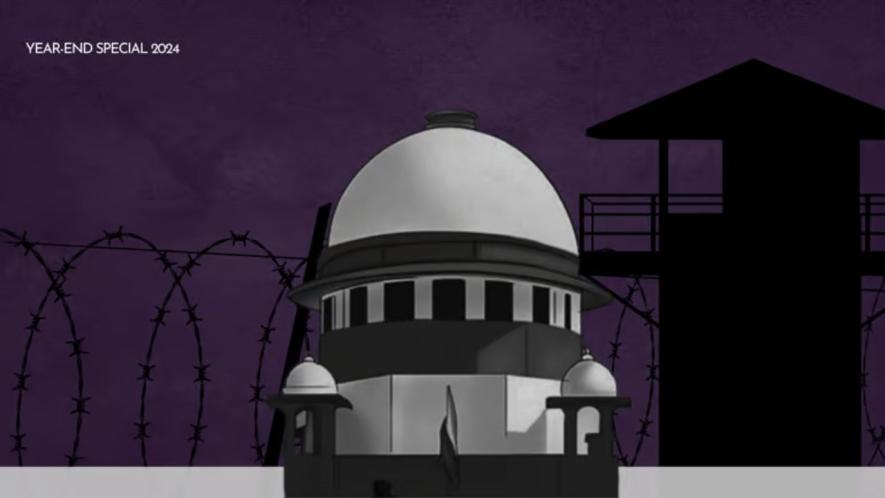The Year That Was—7: SC on Caste Discrimination in Jails

In a significant ruling titled Sukanya Shantha versus Union of India & Ors., the Supreme Court has held that the practice of physical segregation and classification of prisoners based on their caste in various state prisons across India is discriminatory and violative of their fundamental right to life and dignity guaranteed under Article 21 of the Constitution.
This judgment marks a significant step towards dismantling caste-based inequalities in Indian prisons.
Individual states in India have the authority to frame laws on prisons and reformatories as these subjects are included in the ‘State List’ of the Seventh Schedule of the Constitution.
A perusal of the state-specific prison manuals presents a bleak state of affairs concerning the day-to-day practical ordeals faced by lower-caste inmates since time immemorial, irrespective of the nature of the allegation or sentence imposed on them.
The most astonishing examples are from Bihar, West Bengal and Punjab, where the manuals explicitly state that sweepers must be chosen from the Mether or any other similar caste (such as Hari or Chandal castes), and prisoners from any other caste may volunteer to do the work. In other words, prisoners of such Scheduled Castes, unlike others, cannot refuse the sweeping work allotted to them.
Likewise, in Uttar Pradesh, the prison manual states, “Food shall be cooked and carried to the cells by prisoner-cooks of suitable caste, under the superintendence of a jail officer.” The West Bengal prison manual also permits high-caste prisoners to refrain from consuming the food prepared by existing cooks.
Regarding these prison manuals, three main concerns were flagged before the Supreme Court: (a) they directly use ‘caste’ as a yardstick to allot food duties to the prisoners; (b) they use vague terms such as “suitable caste” or “superior method of living” to benefit the higher caste prisoners, and (c) they target the members of denotified tribes.
The Supreme Court dealt with the aforesaid issues at length. It held that the extant provisions reinforce the harmful stereotype and ideology that persons belonging to lower-caste communities are inherently obligated to perform menial and degrading work. They not only cement the deep-rooted societal prejudices but also give legal sanction to caste-based discrimination and Untouchability, which is prohibited under Article 17 of the Constitution.
In addition, the court disapproved the Model Prison Manual, 2016, which acts as a yardstick for the state prison manuals to follow. The court held that although the 2016 manual prohibits any “special treatment” to any group of prisoners based on their caste or religion, it is riddled with many legislative lacunae, such as:
-
First, a “habitual offender” is distinguished from a “casual prisoner” by including within its definition denotified tribes and wandering tribes along with high-risk offenders (such as gangsters, assassins, dacoits, serial killers, rapists, etc.). As a result, a Scheduled Caste undertrial would automatically be treated as akin to a habitual offender as opposed to a casual offender.
For instance, in the states of Andhra Pradesh and Odisha, a member of a wandering or criminal tribe is deemed to be of “bad or dangerous character” and hence is only allowed to do a labour job inside the prison walls, even if they are eligible for an extramural job.
-
Second, the manual fails to explicitly prohibit prisoners’ physical segregation or division in their employment, except for cooking. Although the manual prohibits caste or religion-based discrimination in the “management of kitchen or cooking of food”, it remains silent on all other forms of labour.
For instance, while the prison manuals of Uttar Pradesh and West Bengal restrict cooking duties to only upper-caste prisoners, states such as Madhya Pradesh and Chhattisgarh also mandate prisoners from lower-caste (Mehtars) to perform jobs like cleaning latrines, sweeping and scavenging.
Hence, the court held that the 2016 manual was deemed far from representing the utopian ideal of a state prison manual. The vagueness and ineffectiveness of the manual are evident from its failure to address systemic discrimination and caste-based segregation in prisons.
The manual failed to address caste-based inequalities which are infused into every aspect of society, including prison life and the division of labour inside prisons. It undermines the principles of reformation and rehabilitation, which are the fundamental cornerstones of our criminal justice system.
Accordingly, the court held that caste-based classification, as institutionalised by the state prison manuals, has no rational nexus with the objective to be achieved, i.e., securing security or reform.
It was held that the difference created between inmates based on “habit”, “custom”, and “superior mode of living”, etc., is unconstitutionally vague and indeterminate and used as a weapon to target lower-caste inmates and denotified tribes.
The Supreme Court issued the following directions to deal with the aforesaid issue:
(i) The “caste” column and any references to caste in undertrial and/or convicts’ prisoners’ registers inside the prisons shall be deleted.
(ii) States and Union territories shall revise their prison manuals/Rules within three months on the basis of this decision.
(iii) The Union government has to make necessary changes, as highlighted in this decision, to address caste-based discrimination in the 2016 manual and the Model Act 2023 within three months of the decision.
(iv) The District Legal Services Authority (DLSA) of the states and the board of visitors formed under the 2016 Manual will conduct regular inspections of prisons to identify any caste-based discrimination.
This decision serves as a critical reminder that fundamental rights of all citizens are inviolable, even within the confines of a prison, and no practice can undermine the principles of dignity and equality.
This judgment not only sheds light on the emergent need for uniform prison reforms across the country but also serves as a much-needed nudge to review and reimagine prisons as spaces of correction and rehabilitation that prioritise factors such as ability, work aptitude, accommodation needs, medical and psychological needs, etc., of prisoners over their societal status purely defined by birth.
Nitin Saluja is an advocate-on-record, Supreme Court of India, and managing partner at SLL Law Chambers.
Get the latest reports & analysis with people's perspective on Protests, movements & deep analytical videos, discussions of the current affairs in your Telegram app. Subscribe to NewsClick's Telegram channel & get Real-Time updates on stories, as they get published on our website.
























